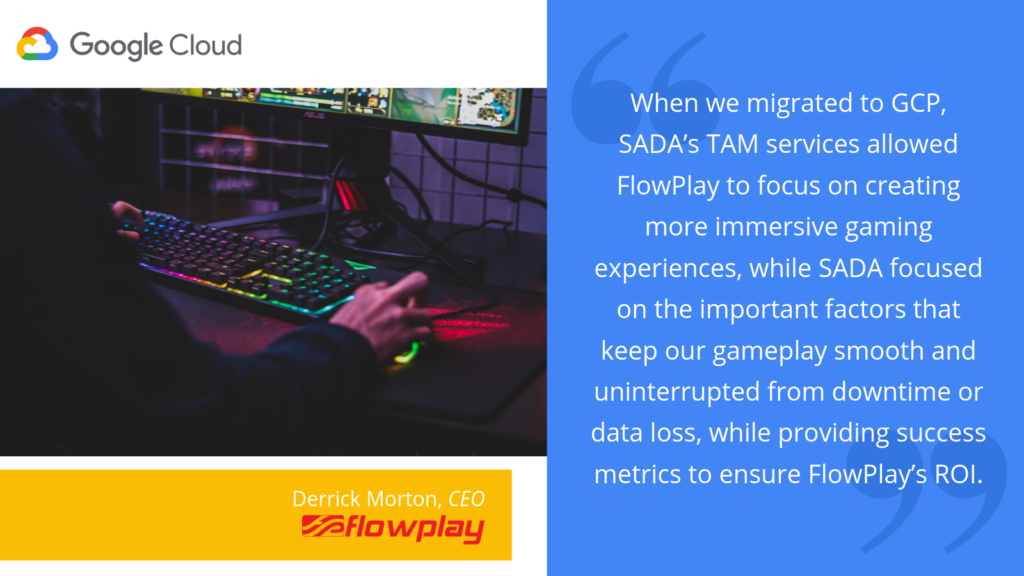FlowPlay, which was founded in 2006, stands out for its unique, community-first approach to game development and its avoidance of the crowded mobile game market and its pricey app stores. FlowPlay’s self-published games are primarily played in-browser, and instead of depending on external platforms, such as Facebook, to provide social experiences outside of their games, FlowPlay builds intricate virtual worlds within their game platforms.
The over 75 million gamers worldwide who play FlowPlay titles such as OurWorld and VegasWorld don’t just play the games; they make friends and immerse themselves in communities. These in-game connections are deep, meaningful, and keep gamers coming back for months, even years. Tens of thousands of couples have participated in “virtual marriages” in-game in VegasWorld, and more than a few of these relationships have transcended the internet and resulted in real-life weddings.
Business Challenge
The back-end technology that makes FlowPlay’s virtual worlds possible is robust. So that players have a flawless experience each time they enter the game, FlowPlay must maintain the highest standards for system uptime, latency, and performance — at a cost that keeps the company profitable. With an international audience base playing 24/7/365, anything less than 100% uptime is unacceptable. “In this industry, there is no such thing as ‘down for maintenance,’” says Douglas Pearson, Flowplay’s Co-Founder and CTO. “There is no ‘off-season.’ There is no window where we can be offline, not ever.”

Game elements must load instantaneously and accurately. People might accept a two-second lag when waiting for a news article to load, but not when playing a game. They also won’t accept transaction errors or other glitches that detract from their in-game experience. “Our games are very detailed, with many small transactions,” Pearson explains. “Every time a player hits a button on a slot machine in VegasWorld, lots of things happen on the back end. It’s almost like running a bank; every coin has to be accounted for.”
Having used servers in a data center for years, FlowPlay had reached a crossroads. The company owned its servers outright, but the equipment was approaching its end of life. Buying new servers didn’t seem prudent in a world that was increasingly cloud-driven, and continuing to rely on physical servers would slow the company’s growth plans. It can take weeks to purchase new servers and get them up and running, while provisioning cloud servers is a 15-minute process.
The company made the decision to migrate to the cloud. They just had to pick the right time to make the switch and ensure that their performance and cost requirements would be met.
Solution
After evaluating Microsoft Azure, AWS, and Google Cloud Platform, FlowPlay’s leadership chose GCP for its user friendliness, flexibility, and performance. “We eliminated Azure pretty quickly because it depended on the Microsoft stack, and that didn’t fit anything we were using internally. That left AWS and GCP,” Pearson notes. “Most of the money we were spending prior to migrating to the cloud was on our databases. Our main driver was how many operations could be made on a drive per second. GCP offered higher disk speeds (IOPS) than AWS, meaning that we’d get the same performance from our databases at a lower cost.”
The company also liked that GCP wouldn’t tie them to a specific server configuration. “AWS requires customers to choose a specific server configuration when buying a long-term contract. With GCP, instead of renting a specific server, we buy computing power,” Pearson said. “This allows us to experiment with servers, drives, configurations, and RAM to optimize performance. We couldn’t have done that as easily with AWS.”
After selecting GCP as cloud platform of choice, partnering with SADA Systems and taking advantage of their technical expertise was, in Pearson’s words, a “no-brainer.”
“Once we chose to move forward with GCP, we partnered with SADA for technical support at no extra cost to us,” Pearson says. “That’s a very strong offering.” FlowPlay liked the idea of getting an immediate point of contact who could respond to their questions and help them work through issues. FlowPlay was looking for help addressing key questions about GCP and their environment that they couldn’t address on their own. SADA’s team was there to help.
Results & benefits
FlowPlay took advantage of SADA’s technical expertise early on when individual servers were spontaneously restarting; SADA helped FlowPlay’s staff address the error codes and get them back on track.
SADA also proved invaluable in fixing a very serious problem with FlowPlay’s master and replica databases. The two databases must be kept perfectly in sync so that in the event of a catastrophic crash, no player data is lost. FlowPlay noticed that the replicas weren’t keeping up with the masters; even if they were only a bit behind, user data could be lost in a crash. SADA’s technical experts quickly evaluated the situation, then escalated the issue to the Google engineering teams who were able to provide detailed assistance on the low-level file I/O issues.
Pearson is also very happy with GCP as their cloud platform. He noted that FlowPlay has seen both quantitative and qualitative benefits to moving away from the data center. Between May 2018 and May 2019, the company saw a 50% increase in traffic — and load. Yet their system response speed had literally doubled, improving performance. “That’s a huge boost in performance, especially since we have significantly more players. When I looked at the numbers, they seemed too good to be true, so I rechecked them! The performance boost means our end users will be delighted with faster performance, and we are, too.”
One area where FlowPlay has seen a very visible cost savings is cybersecurity. When they were using a data center, they were exposed to DDoS attacks and had to spend a significant amount of money on DDoS protection. Since switching to GCP, they haven’t had any need to purchase this service. “Google Cloud takes care of that for us. They take security very seriously,” says Pearson.
“GCP has worked for us the way it is meant to work, and we’re very happy with it,” Pearson says. Now that they’re not bogged down with maintenance tasks, FlowPlay’s internal staff is able to devote more time to internal projects such as new features and new games. Since migrating to the cloud, FlowPlay has launched an additional game and are working on multiple products for future launch. “Working with SADA’s Technical Account Managers, we’re looking forward to using more of GCP’s features to extend our abilities and offerings.”
“FlowPlay doesn’t just create captivating games, we create virtual worlds where millions of global players reside on a daily basis,” says Derrick Morton, CEO of FlowPlay. “When we migrated to GCP, SADA’s technical expertise allowed FlowPlay to focus on creating more immersive gaming experiences, while SADA focused on the important factors that keep our gameplay smooth and uninterrupted from downtime or data loss, while providing success metrics to ensure FlowPlay’s ROI.”



